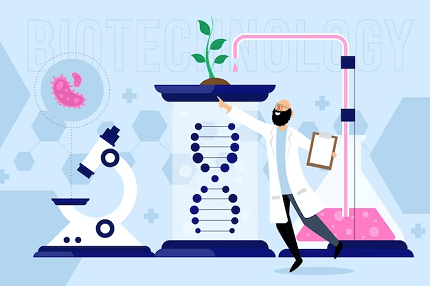Biotechnology and its applications

Biotechnology is a field of biology that combines biology and technology to develop products and technologies for various applications. In the NEET (National Eligibility cum Entrance Test) biology syllabus, the topic of biotechnology and its applications plays a significant role. Here is a crash course overview of the key concepts and subtopics you need to cover:
- Recombinant DNA Technology:
- Genetic Engineering: Introduction to the manipulation of DNA and genes.
- Restriction Enzymes: Enzymes used to cut DNA at specific sites.
- Cloning Vectors: Plasmids and other carriers used to transfer foreign DNA into host organisms.
- DNA Libraries: Collection of cloned DNA fragments.
- Polymerase Chain Reaction (PCR): Technique for amplifying DNA sequences.
- DNA Sequencing: Determining the order of nucleotides in a DNA molecule.
- Transgenic Organisms:
- Transgenic Plants: Introduction of foreign genes into plants to confer desired traits.
- Transgenic Animals: Introduction of foreign genes into animals for research or commercial purposes.
- Applications and Importance: Benefits and controversies surrounding the use of transgenic organisms.
- Biotechnology in Health and Medicine:
- Insulin Production: Use of recombinant DNA technology to produce insulin.
- Human Genome Project: Mapping and sequencing the entire human genome.
- Gene Therapy: Introduction of healthy genes to treat genetic disorders.
- Molecular Diagnostics: Use of biotechnological tools in the diagnosis of diseases.
- Vaccines: Development and production of vaccines using biotechnological methods.
- Biotechnology in Agriculture:
- Plant Tissue Culture: Micropropagation and production of disease-free plants.
- Crop Improvement: Introduction of desirable traits into crops through genetic engineering.
- Biofertilizers and Biopesticides: Use of microorganisms for nutrient supply and pest control.
- Genetically Modified Organisms (GMOs): Controversies and ethical considerations surrounding GMOs.
- Biotechnology in Environment:
- Bioremediation: Use of microorganisms to degrade pollutants in the environment.
- Biomagnification and Bioaccumulation: The role of biotechnology in understanding and addressing environmental issues.
- Conservation Biotechnology: Application of biotechnology for the preservation of endangered species and ecosystems.
It’s important to note that this crash course overview provides a brief summary of the topics covered in the NEET biology syllabus related to biotechnology. To have a comprehensive understanding and perform well in the exam, you should refer to your textbooks, study materials, and practice questions specifically designed for NEET preparation.
What is Required NEET BIOLOGY SYLLABUS Biotechnology and its applications
The National Eligibility cum Entrance Test (NEET) is a competitive exam for admission to medical and dental colleges in India. The NEET biology syllabus includes the topic of biotechnology and its applications. Here is a detailed breakdown of the required NEET biology syllabus for biotechnology:
- Biotechnology: Principles and Processes
- Genetic Engineering and Recombinant DNA Technology: Tools and techniques involved in manipulating genes and DNA.
- Cloning Vectors: Plasmids and other vehicles used to transfer foreign DNA into host organisms.
- DNA Libraries: Collection of cloned DNA fragments.
- Polymerase Chain Reaction (PCR): Technique for amplifying DNA sequences.
- DNA Sequencing: Determining the order of nucleotides in a DNA molecule.
- Biotechnology and its Applications
- Biotechnology in Health and Medicine
- Insulin Production: Use of recombinant DNA technology to produce insulin.
- Human Genome Project: Mapping and sequencing the entire human genome.
- Gene Therapy: Introduction of healthy genes to treat genetic disorders.
- Molecular Diagnostics: Use of biotechnological tools in the diagnosis of diseases.
- Vaccines: Development and production of vaccines using biotechnological methods.
- Biotechnology in Agriculture
- Plant Tissue Culture: Micropropagation and production of disease-free plants.
- Genetic Engineering in Crop Improvement: Introduction of desirable traits into crops.
- Biofertilizers and Biopesticides: Use of microorganisms for nutrient supply and pest control.
- Genetically Modified Organisms (GMOs): Controversies and ethical considerations surrounding GMOs.
- Biotechnology in Environment and Ecology
- Bioremediation: Use of microorganisms to degrade pollutants in the environment.
- Biomagnification and Bioaccumulation: The role of biotechnology in understanding and addressing environmental issues.
- Conservation Biotechnology: Application of biotechnology for the preservation of endangered species and ecosystems.
- Biotechnology in Health and Medicine
It is important to thoroughly study each subtopic mentioned in the NEET biology syllabus for biotechnology. You should refer to your NEET preparation books, study materials, and practice questions specifically tailored to the NEET exam pattern. Additionally, solving previous years’ NEET question papers and taking mock tests will help you familiarize yourself with the exam format and improve your performance.
When is Required NEET BIOLOGY SYLLABUS Biotechnology and its applications
The topic of “Biotechnology and its applications” is included in the NEET biology syllabus. NEET is conducted once a year by the National Testing Agency (NTA) in India. The specific date for the exam may vary each year. It is advisable to check the official NEET website or other reliable sources for the most up-to-date information regarding the exam schedule.
The NEET exam typically takes place in the first half of the year, usually between the months of May and June. However, please note that exam dates can be subject to change, so it’s important to stay updated with the official announcements made by the NTA.
To ensure you are well-prepared for the biotechnology and its applications topic, it is recommended to allocate sufficient time for studying and revising the relevant concepts and subtopics within the NEET biology syllabus. This will help you build a strong foundation and perform well in the exam.
Case Study on NEET BIOLOGY SYLLABUS Biotechnology and its applications
Application of Biotechnology in Agriculture
Introduction: Biotechnology has revolutionized various sectors, and agriculture is one of the areas that has significantly benefited from biotechnological advancements. In this case study, we will explore the application of biotechnology in agriculture, focusing on the genetic engineering of crops and the controversy surrounding genetically modified organisms (GMOs).
Background: With a growing global population and increasing food demand, there is a need to develop sustainable and high-yielding crop varieties. Biotechnology offers valuable tools and techniques to enhance crop productivity, nutritional value, and resistance to pests, diseases, and environmental stressors.
Case Study Scenario: Farmers in a developing country are facing challenges with their crop yield due to frequent pest attacks, particularly by a destructive insect that causes substantial damage to their staple crop. Traditional methods of pest control, such as chemical pesticides, are costly and have limited effectiveness. The government and agricultural experts are exploring biotechnological solutions to address this issue.
Biotechnological Approach: The scientists propose the genetic engineering of the crop to introduce a gene from a naturally occurring bacterium that produces a protein toxic to the pest insect. This protein, known as Bacillus thuringiensis (Bt) toxin, selectively kills the target insect while being harmless to humans and beneficial organisms like bees and butterflies.
Implementation and Benefits: The scientists develop a genetically modified crop variety by incorporating the Bt toxin gene into the crop’s genome. This genetically modified crop is resistant to the pest and offers several advantages:
- Enhanced Pest Resistance: The Bt toxin gene provides built-in resistance against the target pest, reducing crop damage and yield losses.
- Reduced Pesticide Use: As the crop produces its own insecticide, farmers can reduce the application of chemical pesticides, leading to cost savings and minimizing environmental pollution.
- Improved Crop Yield and Quality: By reducing pest damage, the crop yield and quality improve, ensuring better incomes for farmers and a more reliable food supply.
Controversy and Ethical Considerations: Despite the potential benefits, the introduction of genetically modified crops and GMOs is not without controversy. Opponents of GMOs raise concerns about potential environmental risks, effects on human health, and the control of seed supply by large corporations. Some argue for more extensive long-term studies and transparent labeling of genetically modified products to allow consumers to make informed choices.
Conclusion: The application of biotechnology in agriculture, specifically genetic engineering of crops, offers promising solutions to address various agricultural challenges. The use of genetically modified crops can enhance pest resistance, reduce pesticide usage, and improve crop yield and quality. However, it is essential to consider ethical and environmental implications, conduct thorough safety assessments, and promote transparent labeling to ensure the responsible and sustainable use of biotechnology in agriculture.
Note: This case study provides a hypothetical scenario to illustrate the application of biotechnology in agriculture. The specifics of each case study may vary depending on the context and real-world scenarios.
White paper on NEET BIOLOGY SYLLABUS Biotechnology and its applications
A Comprehensive Overview for NEET Preparation
Abstract: This white paper provides a comprehensive overview of the topic “Biotechnology and its applications” in the NEET biology syllabus. Biotechnology has emerged as a significant field that integrates biological principles with technological advancements to revolutionize various sectors, including health, agriculture, and the environment. This white paper aims to provide NEET aspirants with a detailed understanding of the concepts, techniques, and applications of biotechnology, enabling them to excel in the NEET examination.
- Introduction
- Importance of Biotechnology in Modern Biology
- Overview of Biotechnology and its Scope in Various Fields
- Biotechnology: Principles and Processes
- Genetic Engineering and Recombinant DNA Technology
- Cloning Vectors and DNA Libraries
- Polymerase Chain Reaction (PCR)
- DNA Sequencing Techniques
- Applications of Biotechnology in Health and Medicine
- Insulin Production and Human Growth Hormone
- Genetic Testing and Diagnosis
- Gene Therapy and Genome Editing
- Production of Vaccines and Antibodies
- Pharmacogenomics and Personalized Medicine
- Biotechnology in Agriculture and Crop Improvement
- Plant Tissue Culture and Micropropagation
- Genetic Engineering of Crops
- Marker-Assisted Selection (MAS)
- Biofertilizers and Biopesticides
- Genetically Modified Organisms (GMOs) and Controversies
- Biotechnology and Environmental Applications
- Bioremediation and Biodegradation
- Molecular Tools for Environmental Monitoring
- Conservation Biotechnology and Endangered Species Protection
- Genomics and Proteomics in Environmental Studies
- Ethical, Social, and Legal Implications of Biotechnology
- Bioethics and Biotechnological Research
- Intellectual Property Rights and Patents
- GMO Labeling and Consumer Awareness
- Biosafety and Biosecurity Considerations
- Recent Advances and Future Prospects in Biotechnology
- CRISPR-Cas9 and Gene Editing Technologies
- Synthetic Biology and Artificial Life
- Nanobiotechnology and Medical Applications
- Stem Cell Research and Regenerative Medicine
- Bioinformatics and Computational Biology
- NEET Examination Tips and Preparation Strategies
- Recommended Study Resources and References
- Sample Questions and Practice Papers
- Time Management and Exam Strategies
Conclusion: Biotechnology has transformed the field of biology and offers immense potential in various domains. Understanding the principles, processes, and applications of biotechnology is crucial for NEET aspirants to excel in the biology section of the examination. This white paper provides a comprehensive overview of the NEET biology syllabus’s biotechnology topic, equipping students with the necessary knowledge and insights to tackle related questions with confidence. With proper preparation and a deep understanding of biotechnology, NEET aspirants can successfully navigate this important subject and achieve their desired goals in the NEET examination and beyond.
Note: This white paper is a comprehensive overview of the NEET biology syllabus’s biotechnology topic. It is recommended to supplement this white paper with additional study materials, textbooks, and practice questions specifically designed for NEET preparation.
